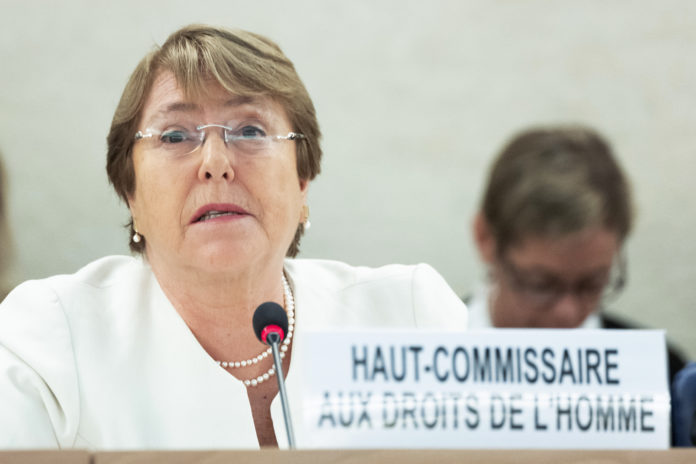In her first appearance at the Human Rights Council, Michelle Bachelet, the new High Commissioner for Human Rights, called for action in Venezuela and Nicaragua, while criticizing Westerners for "building walls".
Former Chilean President Michelle Bachelet began her speech by recalling her past as a political prisoner of the Pinochet regime. She pointed out that, like her father, a general, and her mother, she was tortured by Pinochet's forces. "I was also a refugee and a doctor, including for tortured children," she said.
According to the new High Commissioner, human rights are "the expression of the central purpose of the United Nations". "We can only achieve peace, security and sustainable development for any society if we develop the dignity and equality of all human beings", asserted the former leader.
She insisted on the responsibility of the Human Rights Council not only to denounce all cases of human rights violations, whatever the status of the victim and "regardless of the political regime of a given country", but also to defend, and help to better defend, the inalienable rights of populations.
In this respect, Ms. Bachelet pointed out that, as a former Head of State and Head of Government, she understood the concerns of States, which are primarily responsible for protecting the rights of their populations, she recalled. "If we undermine multilateral institutions like this one, we will fail in the face of the challenges facing our citizens," she asserted, however.
Reviewing the Office's concerns, the new UN High Commissioner for Human Rights welcomed the Human Rights Council's efforts to set up an independent investigation mechanism for Myanmar.
"I welcome the efforts made by States to set up an independent international mechanism for Myanmar, designed to collect, consolidate, preserve and analyze evidence of the most serious international crimes, in order to speed up the holding of trials before national and international courts", said Ms. Bachelet. She urged the Council to adopt a resolution to this effect and "to submit the matter to the General Assembly for its approval, so that such a mechanism can be established." The High Commissioner explained that "this mechanism would complement and support" the work of the International Criminal Court (ICC), which has declared itself competent to investigate the deportation of the Rohingya Muslim minority, which could constitute a crime against humanity. "This is an extremely important step towards ending impunity and addressing the enormous suffering of the Rohingya people," said the former Chilean President.
Turning to the conflict in Syria, Ms. Bachelet also voiced her concern at the impending crisis in Idlib, and called on all countries to urgently take the necessary measures to guarantee the protection of populations and to bring justice to the massive human rights violations they are suffering.
She also expressed shock at the sentencing to death of 75 people in Egypt after a trial that failed to meet international standards of procedural safeguards.
At the Human Rights Council, Ms. Bachelet also spoke about the Global Compact on Migration, due to be adopted in December. For the UN's Chief Human Rights Officer, the Pact offers hope for better governance of migration. It is a balanced document containing achievable and detailed measures to reduce the vulnerability of the world's 258 million migrants," said the High Commissioner.
For Ms. Bachelet, measures hostile to migrants, such as building walls and refusing to respect their rights, "offer no long-term solution and only give rise to hostility, misery, suffering and chaos". "It is in the interest of every state," she insisted, "to adopt migration policies based on reality, not panic.
The High Commissioner reported that further updates from her office covered situations in the following countries: Myanmar, Bangladesh, Cambodia, India, Kashmir region (both sides of the Line of Control), Afghanistan, Democratic People's Republic of Korea, China, Sri Lanka, Syria, Yemen, Saudi Arabia, Iraq, Bahrain, Iran, Egypt, Occupied Palestinian Territory, Eritrea, Ethiopia, Mali, Cameroon, Sudan, South Sudan, Somalia, Central African Republic, Burundi, Democratic Republic of Congo, Turkmenistan, Tajikistan, Russian Federation, Turkey, Ukraine, Colombia, Mexico, Guatemala and Haiti.
In her speech, Ms. Bachelet, who took office on September 1, paid tribute to the work of her predecessor, Zeid Ra'ad Al Hussein, saying that the former High Commissioner's activism, humanity and great intelligence had advanced the cause of human rights.
"Zeid has truly become the voice of the voiceless, the victims of human rights violations" Michelle Bachelet, High Commissioner for Human Rights.


